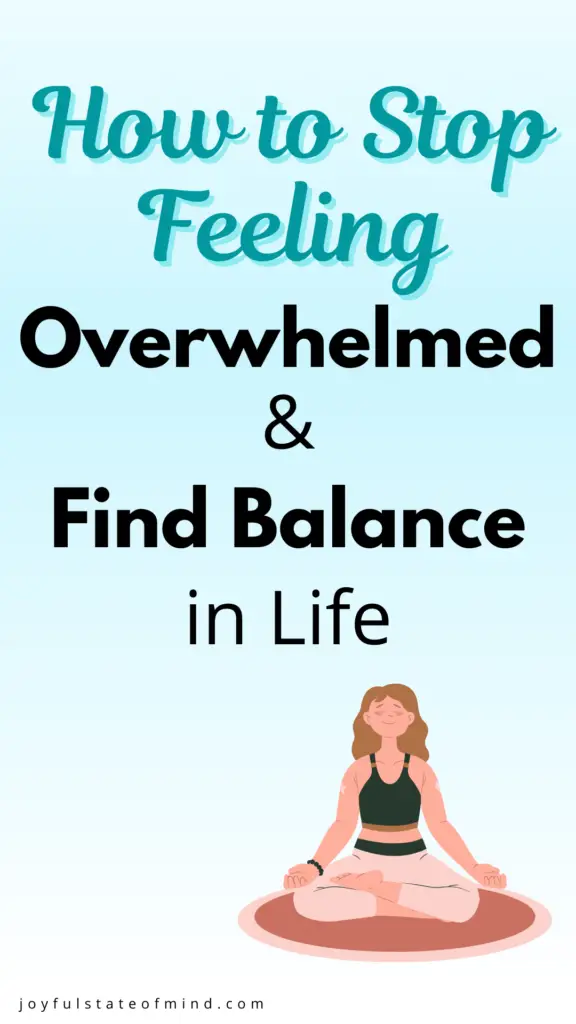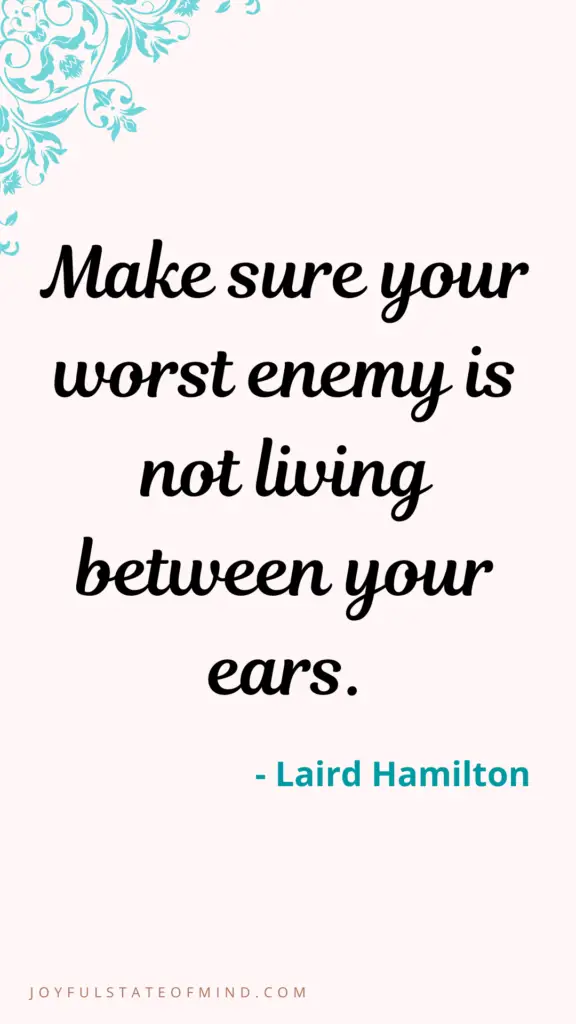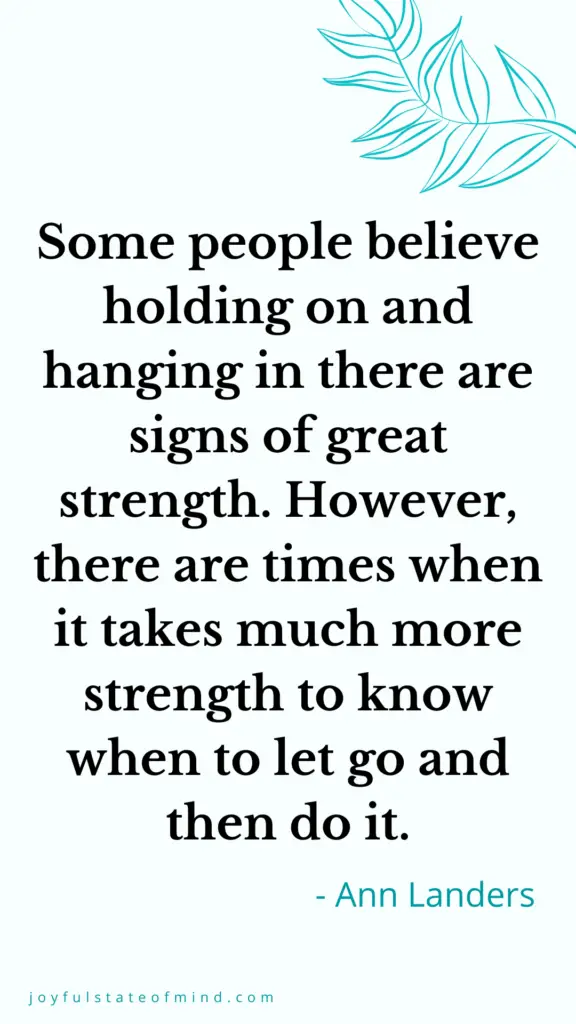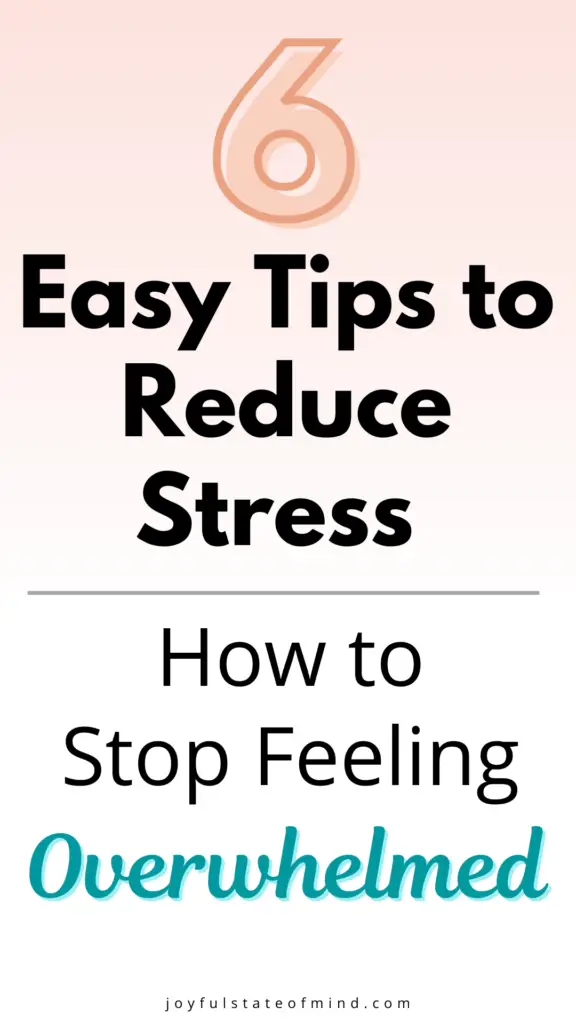How to Stop Feeling Overwhelmed: Easy Tips to Reduce Stress

In this post, discover how to stop feeling overwhelmed, the common signs of overwhelm, its causes, and six simple yet powerful tips to help you overcome it and reduce your stress to find balance and enjoy life more!
This post contains affiliate links, which means I may earn a small commission if you make a purchase, at no cost to you. See my disclaimer for more info.
Sometimes Overwhelm Isn’t So Obvious
I used to believe that being constantly overwhelmed was just a part of life—something inevitable and unavoidable.
While it’s true that stress and overwhelm are natural parts of life, that doesn’t mean we should allow ourselves to live in a constant state of them, especially when they harm our mental and physical well-being.
When my mother recently passed away, I was overwhelmed almost every day. I didn’t even realize it at times, but after reflecting and working through it with my support system, I can now see the connection.
The chronic stomach issues, frequent headaches and migraines, and physical and emotional fatigue were all signs of the stress, anxiety, and overwhelm I was carrying due to the heartbreaking loss.
What Exactly Does It Mean to Feel Overwhelmed?
Feeling overwhelmed means facing more than we can mentally or emotionally handle at once.
It’s different for everyone—some may feel anxious or paralyzed by stress, while others might struggle to focus or experience physical symptoms like headaches or fatigue. It’s often a combination of the two, which has been the case for me recently.
Overwhelm happens when the demands of life pile up, leaving us feeling like we’re drowning in everything we need to do or manage. It’s that sense of being stretched too thin, where even small tasks can feel impossible.
Writing about this made me think of a famous movie quote from Bilbo Baggins in the Lord of the Rings, which is a perfect example of how it feels to be overwhelmed:
Common Signs of Overwhelm

Signs of overwhelm often mean it’s time to take action rather than consistently pushing forward without rest or proper care.
Here Are Some Common Signs: (1 & 2)
- Cognitive symptoms may include racing thoughts, confusion, forgetting, difficulty problem-solving, and difficulty concentrating.
- Physical symptoms may include racing heartbeat, upset stomach, low energy and headaches.
- Mood changes, such as feeling irritable, angry or crying more easily.
- Difficulty falling asleep or sleeping too much.
- Emotional symptoms may include feeling low, more easily panicked and anxious or depressed.
- You become more disorganized and do not tend to proper self-care, such as exercise and healthy eating, because you “have no time.”
💡Important Note: These signs can also be connected with mental health conditions. So, if you’re persistently feeling them, please contact your doctor or a psychotherapist for an assessment.
Causes of Overwhelm
There are also many causes of being overwhelmed, so let’s look at some of the common reasons we all experience it at some point in our lives.
- Significant life changes such as becoming a parent, moving, death or getting a new job.
- Having too many competing responsibilities, whether at work, home, school, or personal life.
- Chronic health issues, whether physical or mental.
- Relationship stressors.
- Perfectionism.
- Fear/concerns about issues out of your control, such as global events/turmoil, chaotic politics or the environment.
- Overuse of social media or other communication forms, such as emails and notifications which can cause information overload.
According to a 2022 report by the American Psychological Association, 56% of young adults (ages 18 to 34) report that their stress is overwhelming most days. A staggering 62% of young women reported feeling completely overwhelmed most days. (3)
These numbers are concerning because high levels of overwhelm can lead to severe mental health issues if left unaddressed. That’s why it’s important to recognize when we’re feeling overwhelmed and take steps to reduce it.
Related post: How To Stop Worrying and Be Happy Now: 11 Simple Yet Powerful Ways
How to Take Care of Yourself When You’re Feeling Overwhelmed

Since we all experience overwhelm regularly, it’s essential to find ways to take care of yourself so that you can stop feeling overwhelmed and stressed.
Some of the techniques below work for different people, so if something doesn’t help you even though you’ve given it a good effort, try something else. Sometimes, combining two or doing some back-to-back is also worth trying.
Some Ideas:
- Mindfulness Activities: Try the Five Senses Technique, which grounds you by focusing on what you see, hear, touch, smell, and taste. Progressive muscle relaxation releases tension by tensing and relaxing muscles. Mindful eating lets you savour each bite, noticing flavours and textures. Or take a gratitude walk, appreciating nature and life’s blessings.
- Deep Breathing: Take deep breaths, keeping your mind focused on the present moment.
- Take Regular Breaks: Take time to pause for self-care, even getting up to drink water or listen to music that lifts your spirits for a few minutes. Be careful not to mindlessly plow through everything on your list to avoid burning yourself out.
- Prayer: Have quiet prayer time during the day to get yourself grounded for whatever is ahead of you.
- Express Yourself: Talk to someone about how you feel to help process your overwhelm. Alternatively, try stress-relief journaling for 5 minutes to reduce your feelings of overwhelm.
- Creative Outlet: Make time every day for your creative outlet, whether DIY, painting, knitting, playing an instrument, or any positive activity that lifts your mood and gets you focused on creating something.
- Calming Exercise: Relaxing movements such as pilates, yoga, stretching or guided meditation.
- Practice Self-Compassion: Be kind to yourself! Don’t pressure yourself to finish everything on your daily to-do list—it’s unrealistic and only leads to guilt. Show yourself grace, let go of the harsh inner critic, and celebrate even small wins. Embrace self-love through positive affirmations and acceptance.
Related post: 44 Must-Have Wellness Gifts for Any Occasion

6 Powerful Tips for How To Stop Feeling Overwhelmed
Feeling overwhelmed can seriously damage your mental and physical health if left unchecked. These tips help you reduce that heavy feeling and take better care of yourself. Each tip will help you manage stress, feel more balanced, and have inner peace.
Let’s examine each tip and two realistic examples of implementing these suggestions to stop feeling overwhelmed.
1. Get Crystal Clear on Your Priorities and Values to Stop Feeling Overwhelmed.
This is key to beating overwhelm and stopping spreading yourself too thin. When you know what truly matters to you, saying no to distractions and unnecessary tasks will become easier. Then, you can use this clarity to guide your decisions and set boundaries that will help protect your time, energy, and peace of mind.
Examples:
#1: If quality time with your kid(s) is your top priority, block off dinner hours or weekend afternoons as non-negotiable time with loved ones. Say no to social events or extra work during those hours.
#2: If exercise is a priority, schedule a 20-minute walk or workout each morning. Treat it like an important meeting or medical appointment—something you don’t skip.
2. Create a Daily Plan That Aligns With Your Biggest Priorities.
Instead of trying to squeeze everything into your day, focus on what truly moves the needle. An intentional plan ensures you can end each day feeling accomplished, knowing you’ve done what’s important—and that’s enough!
Examples:
#1: Instead of writing a long, overwhelming to-do list, identify your top 3 must-dos for the day. For instance, if your priority is a work project, focus on its most essential and challenging tasks first, also known as “eating the frog.”
#2: Try planning your day the night before. This means blocking out specific time frames to work on high-priority tasks, leaving space for breaks, and being realistic about how much you can get done so you don’t overbook yourself.
3. Build Nurturing Routines That Make Space For What Matters.
Life shouldn’t be all work and no play! Establish routines that give you time to recharge and do what lights you up. When you prioritize yourself, you’ll stop feeling buried by your to-do list and start enjoying more of what you want to do.
Examples:
#1: Create a morning routine that includes something calming, like stretching, journaling, or savouring your tea without distractions. This simple practice will set a positive tone for your day ahead.
#2: Set an evening routine where you stop working at a specific time. Use this time to unwind—read a book, bathe, or spend time with your family and avoid using your phone. This helps you recharge for the next day.
4. Let Go of Guilt, Perfectionism, and Unrealistic Expectations.
Carrying around the weight of “shoulds” and constantly feeling like you’re not doing enough? It’s time to work on dropping that baggage to stop feeling overwhelmed. By letting go of unnecessary guilt and the pressure to be perfect, you’ll free yourself up to enjoy more meaningful moments with the people you love—and relax.
Examples:
#1: If you’re constantly striving for perfection, start by giving yourself permission to do “good enough” work. For example, if you’re hosting a party, focus on enjoying time with your guests rather than making every detail picture-perfect.
#2: Practice saying no without guilt and breaking from your people-pleasing habit. Suppose you’re asked to join a committee or take on an extra task that doesn’t align with your priorities; politely decline and protect your time for what matters most.
5. Delegate Tasks.
You don’t have to do it all yourself. Lighten your load by asking for help, whether at work or home. Delegating allows you to focus on what’s most essential and relieves unnecessary stress. Don’t hesitate to ask colleagues to take on tasks they’re capable of or request help from family members with daily chores.
Remember, delegating isn’t a sign of weakness—it’s a smart way to manage your responsibilities.
Examples:
#1: If you’re drowning in tasks at work, delegate smaller projects to a trusted team member. For instance, ask a colleague to schedule meetings or organize data if you manage a project. This frees you up for more significant priorities.
#2: At home, share the household workload. If you usually handle all the cooking, cleaning, or grocery shopping, ask your partner or kids to take on some of these tasks. Even something simple, like having someone else fold the laundry or dry the dishes, can make a big difference.
6. Seek Professional Support.
When overwhelm feels like it’s taking over, there’s no shame in asking for professional help. A therapist can offer a fresh perspective, guidance, and tools to manage stress.
Sometimes, just talking to someone who understands can be a huge relief. Therapy or counselling can provide long-term solutions that help you cope more effectively, regain control, and stop being chronically overwhelmed.
Examples:
#1: Schedule a consultation with a therapist. They can help you pinpoint the causes of your stress and provide actionable techniques, such as mindfulness or cognitive-behavioural strategies, to manage it.
#2: Join a support group or community where people share similar struggles. Being part of a group, either online or in person, can help you feel less alone and offer a safe space to discuss your feelings while receiving support from others.
Small Changes, Big Impact: How to Stop Feeling Overwhelmed

Feeling overwhelmed is a signal that it’s time to pause, reflect, and make changes. You can tackle stress without letting it overwhelm you by embracing self-compassion, breaking tasks down, and delegating when needed. Whether practicing mindfulness, writing it out, or reaching out for help, each small change brings you closer to balance.
Remember, it’s not about doing everything—it’s about making sure you’re caring for yourself along the way. You’ve got this! 💪 💯

Bonus: Quotes About Being Overwhelmed

More Inspirational Quotes About How To Stop Feeling Overwhelmed

Related post: 100+ Happy New Month Quotes for Inspiration

References:
1. Feeling Overwhelmed: Symptoms, Causes, and Coping | VeryWell Mind
2. Feeling Overwhelmed: Symptoms, Causes, & How to Cope | Choosing Therapy
3. Stress in America 2022: Concerned for the future, beset by inflation | American Psychological Association





